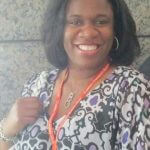Mariah Davis
Annapolis, Maryland
Mariah manages outreach, grassroots advocacy, and civic engagement efforts to support the Choose Clean Water Coalition‘s policy priorities. She also facilitates the Young Professionals of Color mentorship program. Mariah coordinates conservation organizations’ efforts in Maryland, Virginia, Pennsylvania, Delaware, New York, West Virginia, and the District of Columbia. This includes working with conservation organizations at the local, state, and regional levels to enact sound state policies to ensure progress in the Chesapeake Bay restoration effort. Mariah is currently pursuing her Master’s degree in Public Management from the University of Maryland. In 2013, she earned her Bachelor’s degree in Environmental Studies, with a minor in Chemistry from Virginia Commonwealth University.
Mariah was recognized with the Emerging Leader Award at River Rally 2022.
This interview was conducted by Carly Schmidt on September 29, 2020. Learn more about Mariah’s work at ChooseCleanWater.org.
How did you, personally, come into conservation work and the role you’re in today?
I’ve always had a passion for the outdoors and conserving the environment. My parents are military veterans, so as a Navy brat, I’ve had the opportunity to see and experience different parts of the world. Growing up in that lifestyle was both challenging and rewarding because you’re exposed to different types of people and cultures. Having a love for nature and being curious about the world is definitely something that my parents instilled in my brothers and I. After a few moves, my family settled down in Chesapeake, Virginia, a city located at the very bottom of the Chesapeake Bay watershed. I thought I wanted to be a doctor, but I realized that my interest in science was a lot broader. Growing up, I spent a lot of time just on the Elizabeth and James Rivers. I obtained a Bachelor of Environmental Studies and a minor in chemistry from Virginia Commonwealth University and immersed myself in Richmond’s culture.
I ended up doing a lot of different jobs until I found my footing in this career. I interned at the Alliance for the Chesapeake Bay and spoke with homeowners about stormwater best management practices. I interned with Environmental Stewardship Concepts, which consults organizations on Superfund site remediation. I was also an outdoor educator for Blue Sky Fund, a nonprofit that works to create meaningful outdoor experiences for at-risk students. That job was actually a form of mentorship! Being able to take Black, Latino and other children of color outside who were never exposed to the outdoors was definitely a job that I fell in love with. I landed a job at Virginia Conservation Network as an organizer and hosted a few environmental justice roundtables for Congressman McEachern’s office. This was where I started learning the importance of knowing our history. Right now, I am perusing a Master’s in Public Management from the University of Maryland.
Tell me about your role at the Choose Clean Water Coalition.
I am the policy and campaigns manager for the Choose Clean Water Coalition, which is a program of the National Wildlife Federation. I am based in the NWF’s Mid-Atlantic Regional Center and manage outreach, grassroots advocacy, and civic engagement efforts to support all of our Choose Clean Water Coalition policy priorities. I also manage our state leads the program, which provides direct support to Coalition members working on the ground throughout the watershed. Additionally, I lead our efforts for our equity and energy policy priorities.
How do you work as a convener organization for statewide organizations?
The Choose Clean Water Coalition is a convener, much like River Network. We rely heavily on our state lead organizations to help drive out our campaign goals for protecting the Chesapeake Bay watershed. We have 5 state lead organizations that we provide funding to, including the Otsego County Conservation Association, Delaware Nature Society, PennFuture, West Virginia Rivers Coalition, Virginia Conservation Network, and Maryland League of Conservation Voters. We support the organizations that are doing water policy and campaign work at the state level to protect the Bay and their local rivers and streams. We do this through capacity building support from communications, direct lobbying, organizing roundtables, civic engagement work, etc. This is a really dynamic program that helps support coalition members, directly. We’re able to tap into their knowledge on what’s taking place at the state level so that we can advocate at the federal and regional levels.
How does the Choose Clean Water Coalition use the role of state leads to disseminate information and create partnerships to more local, grassroots organizations?
Any organization within our coalition is open to apply for a state leads role. Because we focus so heavily on the federal appropriations process to secure funding for the Chesapeake Bay clean up, we’re really looking for organizations that have expertise in state legislative work and have their finger on the pulse of clean water policy. These organizations are typically working within their general assemblies, government agencies, coalition members, and other stakeholders who shape and mold those policies.
You also host the Young Professionals of Color Mentorship Program. How did this program come about?
Our membership recognized that there was a real need to not only diversify the Bay restoration movement but to retain people of color. In 2016, we launched our environmental justice and equity initiative and surveyed coalition members on what they need to carry out their DEIJ goals. Based on the results of the survey, we produced the DEIJ Action Guide, a set of recommendations on what organizations can and should be doing differently. This was a collaborative effort between the Chesapeake Bay Trust, Chesapeake Bay Funders Network, and our coalition members. Based on the findings, we knew that having more formal types of mentorship for people of color was a way to retain people of color in our movement. Through the Green 2.0 State of Diversity report, we learned that people in leadership roles at environmental organizations are very rarely people of color. The main goal of the YPC mentorship program is to provide meaningful professional development opportunities for young people of color in our career field. As a person of color working in the environmental sector, or any career, you have different lived experiences than non-POC. This mentorship program is a space to find support, share experiences, and receive validation.
Last year, we secured funding through the Chesapeake Bay Trust’s Capacity Building grant to hire a consultant to lead trainings with mentors and mentees. Each mentor and mentee has the opportunity to shape the trainings and what they want to get out of the program. Overall, the program is a good space for people who are in positions of leadership, management, and people who are just finding their footing in their career. It is a space that is open to learning about other people’s experiences so that we can continue to make more space for people of color in the movement.
What does this space look like in practice? How do you facilitate the connection between mentors and mentees?
We have about 34 participants in the program right now. During virtual trainings, we prioritize breakouts and opportunities for people to get together and talk in small groups. Due to Covid-19, we aren’t facilitating large-group trainings. Throughout the year, our mentors and mentees are paired with each other and expected to meet for additional one-on-one experience-sharing.
What are some of your markers of success? What is a success story that you’ve seen come out of the mentorship trainings or relationships?
At the beginning of the year, we had YPC members fill out a needs assessment survey. Each of the trainings was developed based on those results. At the end of each training, we have YPC members fill out a survey so that we can continue to improve with each training. At the end of the program, we plan to assess and compare the results of our surveys with information we’ll gather from YPC members on how they have grown or improved in the areas they self-identified through our trainings.
I’ve seen quite a few different successes since the start of the program. Overall, the program has grown significantly and continues to grow in popularity. I’m excited to see how much enthusiasm there is for the program each year. I’ve seen several mentees in the program move into mentor roles. I’ve seen my colleagues grow personally and professionally to support other people of color in our movements. I have also seen more and more people of color in our movement. The emphasis on DEIJ over the past few years by our coalition members and our funders is a direct result of this. We are so happy and thankful to have received funding for YPC to keep more of our collective efforts and commitment to DEIJ moving forward.
What do you feel is the most impactful part of your work right now?
Surprisingly, one of the most successful outcomes I’ve been a part of happened under President Trump’s administration, an administration that has no appreciation for the environment or anything we stand for as a coalition. The fact that we’ve been able to be secure increased funding for more conservation practices to protect and restore the watershed has been a huge success. In 2016, the President proposed to cut funding for the Chesapeake Bay Program by 90%. The work we have done as a coalition with bipartisan support from Congress has proven to be very successful and impactful.
A lot of the beauty in working in a coalition and being a convener and connector is helping to build and spread knowledge across people and organizations. It’s amazing to see how people are able to connect and learn from each other while moving our shared policy and restoration goals forward. All of our work around diversity, equity, and inclusion has been really impactful, especially during COVID-19. The upcoming presidential election will be essential for clean water success. We’re working really hard with our state leads and collaborating with other coalitions to Get Out the Vote. More information can be found on our website on where to vote and how to vote. You can find resources and tools that your organization can use and adapt to share out with their networks.







